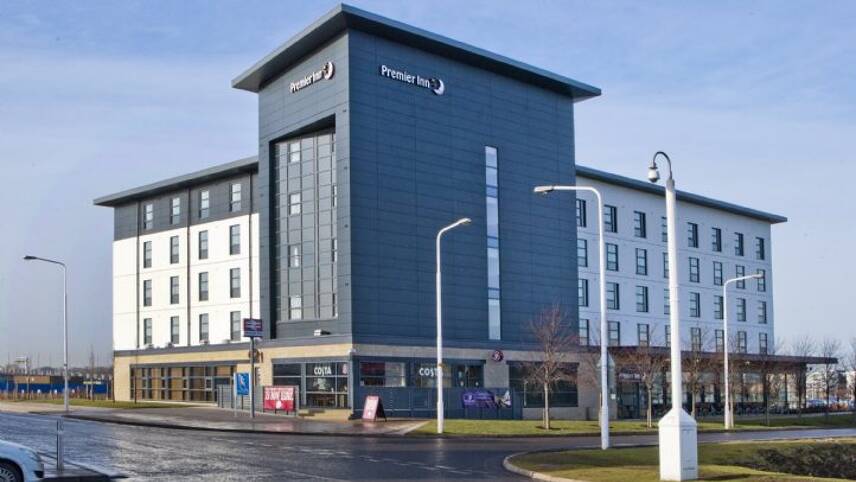Register for free and continue reading
Join our growing army of changemakers and get unlimited access to our premium content

The 100kW battery will be used to power The Gyle at Edinburgh Park (pictured) for at least two hours each day
As part of a partnership with energy firm E.ON, the Whitbread-owned firm installed the lithium-ion battery at the 200-room hotel over the festive period, in a bid to better manage the site’s energy consumption.
The 200kWh battery will be used to store excess energy generated through the hotel’s rooftop solar array and will be used for at least two hours each day in order to secure energy supplies during times of peak demand and low generation.
Premier Inn said in a statement that it chose the Edinburgh Park site to trial the technology for the first time as Scotland is a large producer of renewable power – particularly onshore and offshore wind – which can be prone to volatility.
The site was additionally selected as it is already fitted with energy efficiency and sustainability features, including smart heating, LED lighting and a device which allows E.ON to remotely control energy use from its Glasgow facility.
“Batteries are of course everyday items, but are more commonly associated with powering small household goods, like the TV remote control, so it’s incredibly excited to launch the UK’s first battery-powered hotel – an innovation which will save money, ensure security of supply and support the transition to a more flexible grid,” Whitbread’s head of energy and environment Cian Hatton said.
The battery is expected to save Premier Inn £20,000 per year on energy costs. If cost and carbon savings prove significant, the company will explore the feasibility of rolling out similar battery storage technology across its UK-wide estate of 680 hotels.
“Premier Inn is showing how hotel chains and large power users can further save money, reduce their carbon footprint and support the development of a lower-carbon, smarter energy grid in the UK,” E.ON’s customer accounts director Richard Oakley added.
Sustainability investments
The move from Premier Inn comes as parent company Whitbread strives to meet a commitment to halve its carbon emissions by 2025, against a 2017 baseline.
Since setting this carbon reduction aim, which was approved by the Science Based Targets Initiative (SBTi) in line with a 2C trajectory, the chain has installed rooftop solar arrays at 169 of its UK hotels – more than any other chain nationwide. In total, Premier Inn’s combined solar capacity is estimated to have surpassed 3MW by the end of 2018.
The rest of Premier Inn’s energy demand is met via a renewable energy tariff with SSE, meaning the company has been powered by 100% renewable energy in the UK since 2015. The only exceptions to the tariff are the 15 Whitbread sites where small-scale combined heat and power (CHP) units have been installed.
As for water efficiency, Whitbread became the first UK hospitality chain to receive self-supply licence to deliver its own water and wastewater services from regulator Ofwat in 2017. It hopes that self-supply will enable the brand’s water systems to become more efficient and sustainable, while delivering cost reductions and greater consumption control across its estate.
Whitbread at edie’s Sustainability Leaders Forum
Whitbread’s sustainability director James Pitcher will appear at Day Two of edie’s Sustainability Leaders Forum, to provide his thoughts on what the future of corporate sustainability leadership could look like.
He will be speaking alongside representatives from IHG, Kellogg Europe, The Woodland Trust and Helistrat, who will discuss how businesses can align sustainability with profitability and embed purpose in their core operations.
The two-day event, taking place 5 & 6 February 2019 at the Building Design Centre, London, will also include debates on how to solve the plastics crisis and the state of corporate action on sustainable packaging.
For more information and to register for the Forum, click here.
Sarah George


Please login or Register to leave a comment.